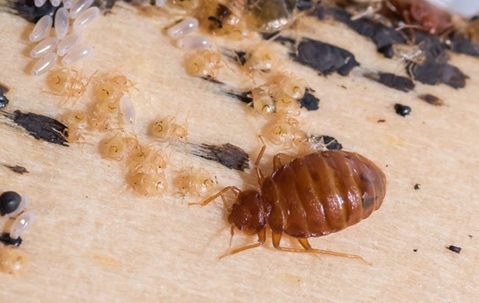Bed Bug Exterminator Houston Treatment: Specialized Techniques for Removal
Bed Bug Exterminator Houston Treatment: Specialized Techniques for Removal
Blog Article
Reliable Pest Control Procedures to Secure Your Yard and Plants
In the realm of horticulture, the harmony of a well-tended yard can usually be interrupted by undesirable pests that endanger the wellness and vigor of plants. As gardeners strive to maintain a flourishing outdoor space, the challenge of parasite control becomes a crucial aspect of their horticultural endeavors. Carrying out reliable bug control gauges not only safeguards the garden's visual appeal however additionally plays a pivotal role in protecting the plants' wellness. By exploring a series of approaches that encompass natural repellents, beneficial insects, friend planting, do it yourself remedies, and environmentally-friendly chemicals, gardeners can navigate the intricate globe of pest administration with precision and care.
Natural Insect Repellents

Another efficient natural insect repellent is diatomaceous earth, a fine-grained compound made from fossilized aquatic microorganisms. Diatomaceous planet works by literally harming bugs with its unpleasant appearance, making it an excellent option for controlling bugs like slugs, beetles, and caterpillars. Additionally, growing buddy plants like marigolds, lavender, or basil can aid push back pests as a result of their solid aromas or all-natural chemical compounds.
Beneficial Pest for Bug Control

An additional advantageous pest is the parasitic wasp, which lays its eggs inside pest bugs, at some point eliminating them. Ground beetles are outstanding for controlling caterpillars, snails, and slugs. Hoverflies, typically mistaken for due to their comparable appearance, eat aphids, thrips, and caterpillars.
To attract advantageous insects to your garden, you can plant a varied series of blooming plants, such as dill, fennel, and yarrow, which give nectar and pollen for grown-up insects. Additionally, prevent using broad-spectrum chemicals that can hurt both damaging and beneficial bugs. By developing a welcoming environment for these valuable bugs, you can minimize the demand for chemical pesticides and promote a much healthier, extra balanced garden environment.
Friend Planting Approaches
When intending to enhance the effectiveness of useful bugs in your garden for all-natural bug control, considering friend growing strategies can additionally optimize the ecosystem equilibrium. go to website Companion growing involves tactically putting specific plants alongside each other to optimize their common benefits, such as preventing pests, bring in beneficial pests, or boosting vitamins and mineral uptake - bed bug exterminator houston near me. One popular instance is planting marigolds along with tomatoes to ward off nematodes and other damaging pests while additionally drawing in pollinators
Additionally, integrating fragrant herbs like basil, mint, or rosemary in between veggie rows can aid hinder pests with their solid aromas. Another effective strategy is planting flowers such as sunflowers, zinnias, or cosmos to bring in pollinators like and butterflies, which in turn can aid in pollinating your fruit and veggie plants. Additionally, planting trap crops like nasturtiums can divert bugs away from your major crops, offering as sacrificial plants that safeguard your important fruit and vegetables. By implementing buddy growing approaches, you can create a varied and unified garden environment that naturally regulates bugs while promoting plant health and performance.
DIY Parasite Control Solutions
To efficiently see it here manage pests in your garden, executing do-it-yourself bug control options can be an economical and environmentally friendly method. One typical do it yourself pest control service is developing home made insecticidal soaps by blending moderate soap with water to regulate soft-bodied pests like aphids, mites, and whiteflies. In addition, introducing beneficial pests such as ladybugs, lacewings, and aggressive wasps can assist naturally control parasite populations in your garden. Establishing physical obstacles like row covers or netting can likewise prevent bugs like caterpillars from damaging your plants.
Buddy growing specific herbs and blossoms like marigolds, basil, and lavender can help push back insects and bring in beneficial bugs. By incorporating these Do it yourself insect control remedies right into your gardening regimen, you can secure your garden and plants without counting on severe chemicals.
Environmentally-Friendly Pesticides

One more reliable choice is diatomaceous earth, an all-natural compound made from fossilized marine organisms, my site which can be sprayed around plants to control slugs, snails, and other crawling bugs. In addition, insecticidal soaps and oils obtained from plant-based sources are useful for managing soft-bodied pests like aphids, termites, and whiteflies.
Conclusion
In final thought, effective insect control actions such as natural repellents, useful bugs, buddy growing approaches, do it yourself services, and environmentally-friendly chemicals are important for shielding your garden and plants. By carrying out these methods, you can prevent damages triggered by bugs and keep a healthy and balanced and growing yard community. It is necessary to think about the long-lasting impact of utilizing chemicals and select more sustainable and eco-friendly options to make sure the health and wellness and well-being of your plants and the atmosphere.
Report this page